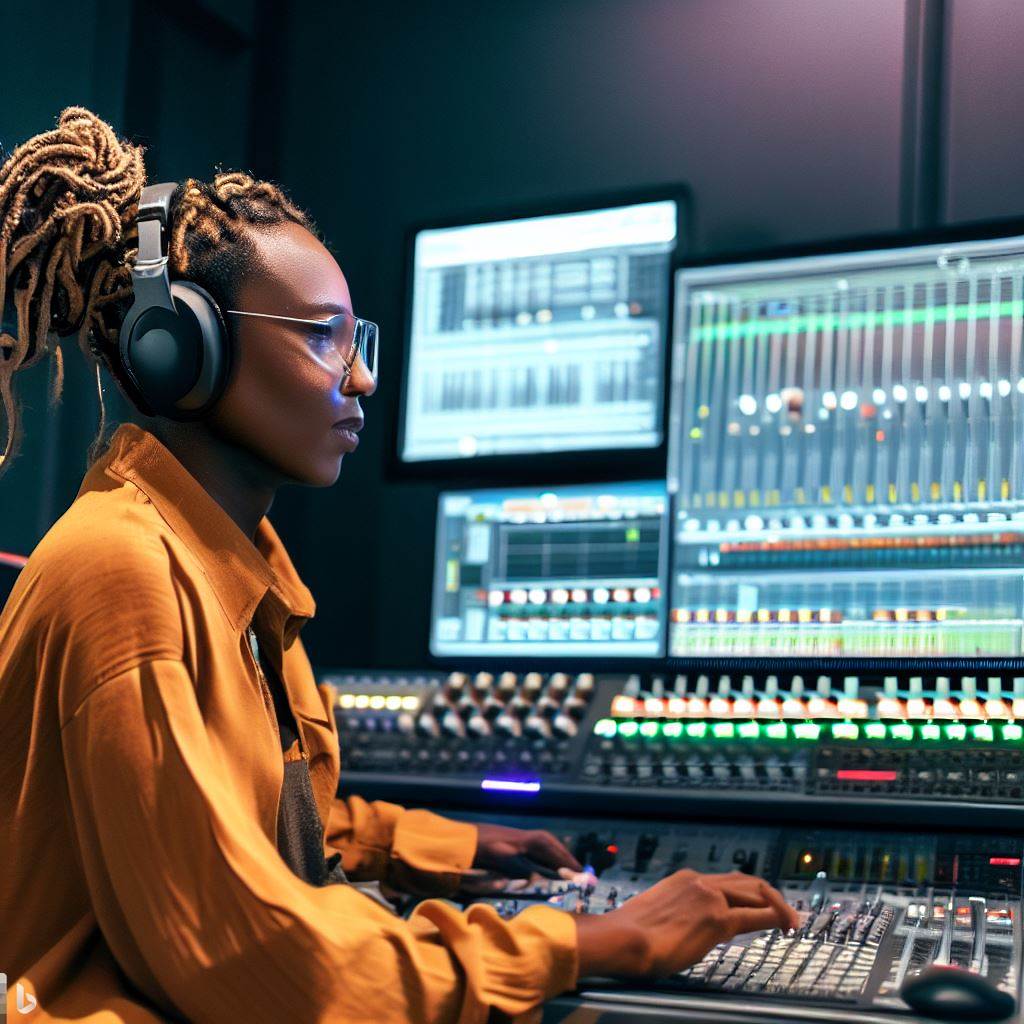Introduction
Music publishing involves the administration and exploitation of music compositions and their copyrights.
Understanding the music publishing landscape in Nigeria is crucial for artists, songwriters, and industry professionals.
Nigeria, the giant of Africa and home to a vibrant music industry, has witnessed significant growth and global recognition in recent years.
However, amidst this rise, understanding the music publishing landscape becomes crucial for artists, songwriters, and industry professionals.
Brief explanation of music publishing
Music publishing involves the administration and exploitation of music compositions and their copyrights. It encompasses activities such as licensing, collecting royalties, and protecting intellectual property rights.
Publishers play a vital role in representing songwriters and composers, ensuring their work is properly distributed, marketed, and compensated.
Importance of understanding the music publishing landscape in Nigeria
- Royalty collection and distribution: Nigeria’s music publishing landscape contributes to the collection and distribution of royalties to rights holders, which include songwriters, composers, and publishers.
Understanding this landscape ensures fair compensation for creators and encourages continuous creativity. - Intellectual property protection: With the surge in music consumption via streaming platforms and digital downloads, the ability to safeguard musical works from unauthorized use and piracy becomes crucial.
Knowledge of the music publishing landscape helps artists and creators enforce their rights and combat copyright infringement. - Revenue generation: Music publishing presents various revenue streams for artists and songwriters, including mechanical royalties, synchronization licenses, and performance royalties.
Understanding the landscape enables creators to maximize their earnings and explore new opportunities for monetizing their music.
In the end, comprehending the music publishing landscape is essential for all stakeholders within the Nigerian music industry.
It ensures fair compensation, protects intellectual property, and maximizes revenue for artists, songwriters, and publishers.
In the next section, we will delve further into the specific elements of the music publishing landscape in Nigeria, shedding light on its challenges and opportunities.
The Current State of Music Publishing in Nigeria
Overview of the Nigerian music industry
- The Nigerian music industry is vibrant and diverse, known for its unique blend of afrobeat, hip hop, and traditional music.
- It is the largest music industry in Africa, with a thriving ecosystem of artists, producers, and record labels.
- Nigerian music has gained international recognition, with artists like Burna Boy and Wizkid making waves globally.
Key players in the music publishing sector
- Music publishers play a crucial role in Nigeria, as they are responsible for licensing, promotion, and distribution of music.
- Major record labels like Mavin Records, Chocolate City, and DMW have their own publishing arms.
- Companies like Africori and Freeme Digital also dominate the music publishing landscape in Nigeria.
Challenges faced by music publishers in Nigeria
- Copyright infringement is a major issue, with unauthorized use and distribution of music being prevalent.
- Limited access to funding and investment inhibits the growth of music publishing companies.
- Inadequate legal framework and enforcement make it difficult for publishers to protect their intellectual property.
- Royalty collection and distribution systems are inefficient, hampering the earnings of publishers and songwriters.
Opportunities for growth and improvement
- Strengthening copyright laws and enforcement will protect the rights of music publishers and encourage investment.
- Collaboration with technology companies can help develop innovative solutions for royalty collection and tracking.
- Education and awareness programs can educate artists and consumers about the importance of music licensing and copyright.
- Increased investment in music publishing infrastructure will support the growth of the industry.
The music publishing landscape in Nigeria faces significant challenges, but also holds immense potential for growth.
With the right reforms and investments, music publishers can thrive and contribute to the development of the Nigerian music industry.
It is essential to prioritize the protection of intellectual property and ensure fair compensation for creators.
Read: Exploring Income Potential: The Pay for Translator in Nigeria
Major Revenue Streams in Music Publishing
In the music publishing industry, there are several significant revenue streams that artists and publishers rely on.
Mechanical royalties
Mechanical royalties refer to the revenue generated from physical sales and digital downloads of music. It is a fee paid to songwriters and publishers for the right to reproduce and distribute their compositions.
These royalties are typically collected by mechanical rights organizations or publishing companies.
Whenever a song is sold as a physical CD, vinyl, or downloaded through platforms like iTunes, mechanical royalties are earned.
These royalties are crucial for songwriters and publishers as they provide a stable income stream.
They are often paid on a per-unit basis, calculated using a predetermined percentage of the retail price or ICP (Internal Controlled Price).
Public performance royalties
Public performance royalties are generated when a song is performed or played in public.
This includes live performances, radio airplay, music streaming platforms, TV broadcasts, and even background music in public spaces.
Performing rights organizations (PROs) such as ASCAP, BMI, and SESAC collect these royalties and distribute them to songwriters and publishers.
Artists rely on these royalties to earn income from their music being played in various public settings.
PROs track performances of songs through monitoring systems and collect fees from businesses that use music publicly.
Synchronization royalties
Synchronization royalties are earned when a song is used in TV shows, films, commercials, video games, or other visual media.
These royalties are paid to songwriters and publishers for the synchronization (sync) of their music with visual content.
The value of sync royalties varies based on the prominence and popularity of the song, as well as the medium in which it is used.
Sync licensing is often negotiated through sync agents or music supervisors who represent the interests of songwriters and publishers.
Sync royalties offer significant earning potential for artists and publishers, especially if their songs are featured in successful and widely-watched media.
Digital streaming royalties
With the rise of digital platforms like Spotify, Apple Music, and YouTube, streaming royalties have become an essential revenue stream.
Streaming royalties are generated when songs are played on these platforms and are paid to the songwriters, performers, and publishers.
However, the rates and distribution of streaming royalties have become a contentious issue within the music industry.
Artists and publishers often receive fractions of a cent per stream, leading to debates about fair compensation for their work.
Nonetheless, streaming is a vital revenue source, especially for artists with a strong presence on popular streaming platforms.
In conclusion, music publishing revenue streams are diverse and crucial for the sustainability of songwriters and publishers.
Mechanical, public performance, synchronization, and digital streaming royalties all contribute to the financial success of music creators.
While the industry continues to evolve and adapt to new technologies and digital platforms, ensuring fair compensation for artists remains a significant challenge.
By understanding these revenue streams, artists and publishers can navigate the complex landscape of the music industry and maximize their earning potential.
Read: How to Start a Music Publishing Career in Nigeria
Copyright Laws and Regulations in Nigeria
Overview of copyright laws and regulations in Nigeria
- Copyright laws in Nigeria are governed by the Copyright Act of 1988 and subsequent amendments.
- These laws protect original works of authorship, including music compositions, lyrics, and sound recordings.
- Copyright protection is automatic upon creation of a work, without the need for registration.
- The duration of copyright protection varies depending on the type of work but generally lasts for the author’s lifetime plus 70 years.
- Nigerian copyright laws also recognize neighboring rights, which grant protection to performers, producers, and broadcasters.
The role of the Nigerian Copyright Commission (NCC)
- The Nigerian Copyright Commission (NCC) is the government agency responsible for copyright administration and enforcement.
- The NCC’s main function is to regulate and protect copyrighted works in Nigeria.
- It grants licenses and collects royalties on behalf of copyright owners.
- The NCC also conducts awareness campaigns, seminars, and workshops to educate the public on copyright laws and infringement issues.
- It works in collaboration with relevant stakeholders, such as music publishers, to ensure the effective implementation of copyright laws.
Importance of copyright protection for music publishers
- Copyright protection is crucial for music publishers as it safeguards their intellectual property rights.
- It provides exclusive rights to reproduce, distribute, and publicly perform their musical works.
- Copyright protection enables music publishers to control and monetize their creations by granting licenses and collecting royalties.
- Without copyright protection, music publishers may face difficulties in enforcing their rights and combating piracy.
- Copyright infringement can significantly impact the financial and creative interests of music publishers.
In general, copyright laws and regulations in Nigeria play a vital role in protecting the rights of music publishers.
The Nigerian Copyright Commission (NCC) serves as a crucial regulatory body in ensuring the enforcement of these laws.
Copyright protection is essential for music publishers as it grants them exclusive rights and enables them to monetize their creative works.
Upholding copyright laws is essential in fostering a vibrant and sustainable music publishing landscape in Nigeria.
Read: Career Path: From Novice to Pro Sound Editor in Nigeria
Music Publishing Organizations and Collecting Societies in Nigeria
Music publishing organizations and collecting societies play a crucial role in the Nigerian music industry.
These organizations are responsible for ensuring the proper legal protection and management of musical works.
In Nigeria, there are several prominent organizations that fulfill this role, including the Nigerian Music Publishers Association (NMPA), the Copyright Society of Nigeria (COSON), and the Nigerian Copyright Licensing Agency (NCLA).
Nigerian Music Publishers Association (NMPA)
The Nigerian Music Publishers Association (NMPA) is an association that represents the interests of music publishers in Nigeria.
Its primary objective is to foster the growth and development of music publishing in the country.
The NMPA plays a vital role in protecting and enforcing the rights of its members, ensuring that they receive proper compensation for their works.
Copyright Society of Nigeria (COSON)
The Copyright Society of Nigeria (COSON) is a collecting society that is responsible for licensing the use of musical works on behalf of copyright owners.
Its primary function is to ensure that copyright owners receive royalties for the commercial use of their works.
COSON collects royalties from various users of music, such as radio and television stations, hotels, restaurants, and businesses that play music publicly.
Nigerian Copyright Licensing Agency (NCLA)
The Nigerian Copyright Licensing Agency (NCLA) also plays a significant role in the music publishing landscape in Nigeria.
It operates as a regulatory body that grants licenses for the use of copyrighted works.
The NCLA establishes guidelines for licensing and ensures that proper remuneration is paid to copyright owners when their works are used.
Functions and roles of these organizations
These organizations have several functions and roles within the music publishing industry in Nigeria.
Firstly, they advocate for the rights of music publishers and copyright owners, ensuring that they receive fair compensation for their creative works.
They also provide a platform for collaboration and networking within the industry, fostering partnerships between publishers, songwriters, composers, and performers.
Another critical role of these organizations is the enforcement of copyright laws and intellectual property rights.
They work towards combating piracy and unauthorized use of copyrighted works, taking legal actions against infringers.
They also educate the public about the importance of respecting copyright laws and encourage consumers to legally obtain music through licensed platforms.
Furthermore, these organizations support the development and promotion of local talent.
They provide resources and support for emerging songwriters and composers, helping them gain exposure and recognition in the music industry.
They also facilitate the licensing and distribution of music both locally and internationally, ensuring that Nigerian music reaches a global audience.
In a nutshell, music publishing organizations and collecting societies in Nigeria play a vital role in the protection and management of musical works.
The Nigerian Music Publishers Association (NMPA), the Copyright Society of Nigeria (COSON), and the Nigerian Copyright Licensing Agency (NCLA) work together to ensure that copyright owners receive proper compensation and that the rights of music publishers are upheld.
Their functions encompass advocating for copyright owners, enforcing copyright laws, supporting local talent, and facilitating the licensing and distribution of music.
These organizations are essential for the growth and sustainability of the Nigerian music industry.
Read: Top Interpreter and Translator Training Institutions in Nigeria

The Impact of Digitalization on Music Publishing
The rise of digital platforms and streaming services has had a profound impact on the music publishing industry in Nigeria.
This section will explore the challenges and opportunities faced by music publishers in the digital era and emphasize the importance of adapting to digital trends for success.
Rise of digital platforms and streaming services
- Digital platforms such as music streaming services have revolutionized the way music is consumed.
- These platforms offer instant access to a vast catalogue of songs from various genres and artists.
- Streaming services like Spotify, Apple Music, and Deezer have gained significant popularity among Nigerian music enthusiasts.
- The convenience and affordability of these platforms have led to a decline in physical music sales.
- Artists and music publishers now rely heavily on streaming revenue as a primary source of income.
Challenges and opportunities for music publishers in the digital era
- One of the major challenges faced by music publishers is piracy and unauthorized distribution of music.
- Digital platforms have made it easier for music to be illegally downloaded and shared, leading to financial losses for publishers.
- However, digitalization has also opened up new opportunities for music publishers to reach a wider audience.
- Independent artists and publishers can now distribute their music globally without the need for record label contracts.
- Digital platforms also provide valuable data and analytics that help publishers understand their audience better.
Importance of adapting to digital trends for success
- In order to thrive in the digital era, music publishers must embrace the changing landscape.
- It is crucial for publishers to establish a strong online presence through social media and streaming platforms.
- Collaborating with digital influencers and tastemakers can help increase visibility and reach.
- Publishers should also invest in digital marketing strategies to promote their artists effectively.
- Moreover, staying updated with technological advancements and digital trends is essential for sustained success.
Basically, the digitalization of the music publishing landscape in Nigeria has brought about both challenges and opportunities.
While piracy remains a concern, digital platforms and streaming services offer new ways for music publishers to reach a wider audience and generate revenue.
Adapting to digital trends, establishing an online presence, and leveraging data and analytics are crucial for success in this evolving industry.
By embracing the digital era, music publishers can thrive in the ever-changing music landscape of Nigeria.
Find Out More: The Relationship between Artists and Managers in Nigeria
Strategies for Monetizing Music Publishing in Nigeria
Effective music catalog management
- Regularly update and maintain an organized catalog to ensure accurate royalty distribution.
- Implement a thorough metadata system to track and administer song rights and licenses.
- Use technology tools and software to streamline catalog management processes.
Licensing and synchronization deals
- Collaborate with advertising agencies, film production companies, and TV shows to secure lucrative licensing deals.
- Focus on syncing songs with visual media, such as commercials, films, and television programs.
- Negotiate fair royalty rates and terms for synchronization deals to maximize revenue.
Collaboration with local and international artists/producers
- Foster partnerships with talented Nigerian artists and producers to create hit songs.
- Collaborate with renowned international artists to gain exposure in global markets.
- Explore cross-genre collaborations to expand the reach of music publishing.
Maximizing digital distribution and streaming revenue
- Distribute music through digital platforms such as streaming services, online stores, and social media.
- Optimize search engine rankings through effective metadata, keywords, and tags.
- Engage in targeted marketing campaigns to promote music to the right audience.
Creating and leveraging publishing rights
- Obtain publishing rights from songwriters and composers to earn royalties from their compositions.
- Protect and enforce copyright rights to prevent unauthorized usage and maximize revenue.
- Explore sub-publishing agreements to expand the reach of music publishing globally.
Building relationships with music supervisors and influencers
- Network with music supervisors who curate soundtracks for films, TV shows, and commercials.
- Seek endorsements and promotional opportunities from influential bloggers, vloggers, and social media personalities.
- Collaborate with popular DJs in clubs and radio stations to increase exposure and demand for music.
Expanding into live performances and events
- Organize concerts, tours, and music festivals featuring artists from the music publishing catalog.
- Secure sponsorships and partnerships to financially support live performances.
- Leverage the popularity of Nigerian music and artists to attract international audiences and generate revenue.
Establishing partnerships with brands and businesses
- Seek collaborations with brands and businesses for product placements, endorsements, and sponsorship opportunities.
- Leverage the brand values and target audience of partner businesses to enhance reach and revenue potential.
- Ensure a mutually beneficial partnership by delivering high-quality music and marketing support.
Continuous education and industry knowledge
- Stay informed about industry trends, changes in regulations, and emerging technologies.
- Attend conferences, workshops, and seminars to network and learn from industry experts.
- Engage in ongoing professional development to adapt to the evolving music publishing landscape.
All in all, music publishing in Nigeria can be monetized through effective catalog management, licensing deals, collaborations, digital distribution, and leveraging publishing rights.
Building relationships with key industry players, expanding into live performances, and establishing partnerships with brands are also essential strategies.
Additionally, staying abreast of industry knowledge and continuously educating oneself is crucial for long-term success in the music publishing industry.
Uncover the Details: Evolution of the Music Director Profession in Nigeria
Case Studies of Successful Music Publishers in Nigeria
Analysis of prominent music publishers in Nigeria
- Afro Music Pop (AMP) Publishing: AMP Publishing is one of the leading music publishing companies in Nigeria and is known for its diverse portfolio of successful music artists.
- Soundway Music Publishing: With a focus on traditional Nigerian music, Soundway Music Publishing has gained recognition for its extensive catalog and ability to showcase authentic Nigerian sounds.
- New Music International: This music publishing company has carved a niche in the Nigerian music industry by promoting and supporting emerging talents through strategic partnerships and collaborations.
- Black Major: Black Major has established itself as a prominent music publisher in Nigeria by representing a range of artists and genres, bridging the gap between local and international markets.
- Chocolate City Music Publishing: Known for its commitment to nurturing talent, Chocolate City Music Publishing has successfully boosted the careers of many Nigerian artists through innovative marketing and distribution strategies.
Factors contributing to their success
- Quality Artist Roster: Successful music publishers in Nigeria have built a strong reputation by curating a roster of talented artists who consistently deliver high-quality music.
- Effective A&R Strategies: These publishers invest in nurturing and developing upcoming artists, ensuring that they have access to the necessary resources for their artistic growth.
- Strategic Partnerships: Collaborations with record labels, distributors, and other industry stakeholders allow music publishers to expand their reach and maximize their impact.
- Market Understanding: Successful publishers keenly understand the dynamics of the Nigerian music landscape and tailor their strategies to cater to the local audience’s preferences.
- Adaptability: Given the ever-evolving nature of the music industry, successful music publishers in Nigeria demonstrate the ability to adapt quickly to new trends and technologies.
Lessons that can be learned from their experiences
- Invest in Talent Development: Fostering and supporting emerging talent is crucial for sustained success in the music publishing industry.
- Build Diverse Catalogs: Having a diverse range of artists and genres in the catalog helps attract a broader audience and opens up avenues for potential licensing opportunities.
- Cultivate Relationships: Collaborating and building strong relationships with stakeholders within the music industry can lead to valuable partnerships and increased visibility.
- Stay Ahead of Trends: Being proactive and staying up to date with emerging trends and technologies enables music publishers to stay relevant in a dynamic industry.
- Focus on Local Market: Understanding and catering to the unique preferences and tastes of the local market can be a key driver of success in Nigeria’s music publishing landscape.
Explore Further: Insights into Nigeria’s Indigenous Language Songwriting
Uncover the Details: Understanding Nigeria’s Press Freedom Challenges
Conclusion
Recap of key points discussed
Throughout this blog chapter, we have examined the music publishing landscape in Nigeria. We discussed the various players in the industry, including publishers, songwriters, and performers.
We also explored the importance of copyright protection and licensing agreements.
Importance of understanding the music publishing landscape in Nigeria
Having a deep understanding of the music publishing landscape in Nigeria is crucial for anyone involved in the music industry.
It allows for the proper protection of intellectual property rights and ensures that artists are appropriately compensated for their work.
Encouragement to explore opportunities in the Nigerian music publishing industry
The Nigerian music publishing industry is experiencing significant growth and presents numerous opportunities for aspiring musicians, songwriters, and publishers.
By delving into this thriving market, individuals can tap into a diverse music culture and establish themselves as key players in the industry.
The music publishing landscape in Nigeria offers a promising avenue for those passionate about music and business.
By understanding its dynamics and nuances, individuals can navigate this industry successfully and contribute to its further growth.




